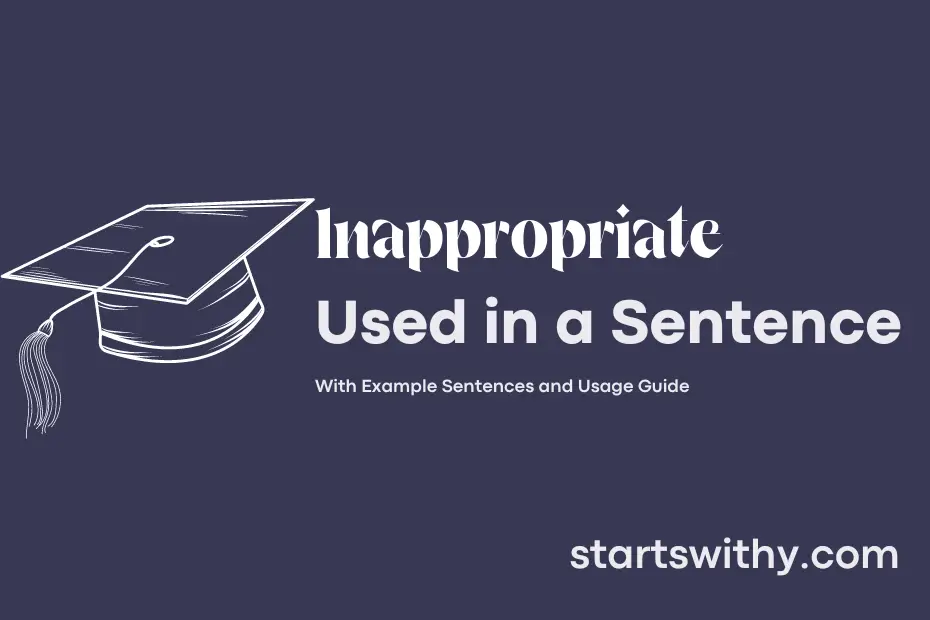Have you ever struggled to find the right words in social situations to address something that just doesn’t feel right? The term “inappropriate” refers to behavior, language, or actions that are not suitable or proper for a particular context or audience.
Navigating what is considered appropriate or inappropriate can be challenging, as social norms and expectations vary greatly among different cultures and individuals. Determining the line between what is acceptable and what is not can be a delicate balancing act, requiring awareness, sensitivity, and good judgment.
7 Examples Of Inappropriate Used In a Sentence For Kids
- Playing loudly in class is inappropriate.
- Talking when the teacher is speaking is inappropriate.
- Not sharing toys with friends is inappropriate.
- Running in the classroom is inappropriate.
- Not listening to the teacher is inappropriate.
- Drawing on the walls is inappropriate.
- Being mean to classmates is inappropriate.
14 Sentences with Inappropriate Examples
- Inappropriate behavior in the classroom will not be tolerated by the professors.
- It is considered inappropriate to use your phone during a guest lecture.
- Wearing inappropriate clothing to a college event can reflect poorly on you.
- Submitting someone else’s work as your own is considered inappropriate and can result in serious consequences.
- It is inappropriate to plagiarize information in your assignments.
- Engaging in inappropriate relationships with professors or staff members is against college policies.
- Making inappropriate jokes or comments during a presentation is unprofessional.
- Sharing inappropriate content on social media can harm your reputation as a college student.
- Inappropriate behavior at campus events can lead to disciplinary action.
- Using inappropriate language in group discussions or debates is disrespectful.
- Posting inappropriate content in the college group chat could get you in trouble with the administration.
- It is inappropriate to cheat on exams or quizzes to get ahead academically.
- Taking inappropriate shortcuts in your research or academic projects will not benefit you in the long run.
- Attending class under the influence of alcohol or drugs is highly inappropriate and disrupts the learning environment.
How To Use Inappropriate in Sentences?
To use the word “inappropriate” correctly in a sentence, you need to understand its meaning and how it is typically used in context. “Inappropriate” describes something that is not suitable or proper for a particular situation.
Here is an example sentence using the word “inappropriate”:
– Inappropriate behavior in the workplace can lead to disciplinary action.
When constructing a sentence with “inappropriate,” be sure to consider the context and tone of the situation. It is often used to describe actions, behavior, language, or attire that is not considered acceptable, especially in formal or professional settings.
Remember that “inappropriate” is an adjective, so it is usually used before a noun to describe it. You can also use it at the beginning or middle of a sentence depending on the emphasis you want to give.
For instance:
– The teacher scolded the student for inappropriate comments during class.
– Inappropriate attire for the wedding included jeans and a t-shirt.
When using “inappropriate,” it’s important to be mindful of the context and audience to ensure that the message you are conveying is clear and appropriate. Experiment with different sentence structures to become more comfortable incorporating “inappropriate” into your writing or conversations.
Conclusion
Inappropriate sentences can be harmful, offensive, or disrespectful, and they can have serious consequences. It is essential to be mindful of the language we use and to avoid making inappropriate remarks that can hurt others. Creating a positive and respectful environment requires being conscious of our communication and ensuring that our words are considerate and appropriate for the situation.
By being intentional with our language and choosing our words carefully, we can cultivate a culture of respect and inclusivity. It is important to consider the impact of our sentences and to strive for communication that is uplifting and constructive. Through conscious effort and sensitivity to others’ feelings, we can contribute to a more harmonious and understanding society.



